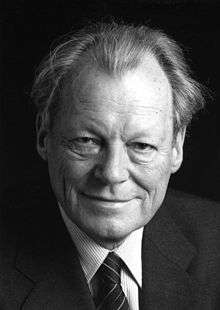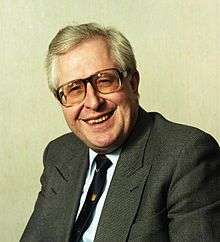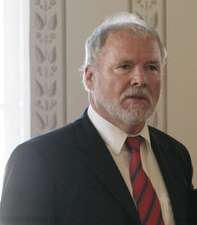President of the German Bundesrat
 |
| This article is part of a series on the politics and government of Germany |
|
Constitution ("Fundamental Law Code") |
|
| Foreign relations |
In Germany, the President of the Bundesrat or President of the Federal Council (German: Bundesratspräsident) is the chairperson or speaker of the Bundesrat (Federal Council). He or she is elected by the Bundesrat for a term of one year (usually from November 1 to October 31 in the next year). Traditionally, the Presidency of the Bundesrat rotates among the heads of government (most of them holding the title Minister President) of each of the states (in German, Länder). As well as acting as a chairperson the President of the Bundesrat acts in place of the President of Germany, if the latter is unable to perform his duties, dies or resigns.
The President of the Bundesrat convenes and chairs plenary sessions of the body and is formally responsible for representing the Federal Republic in the Bundesrat. He or she is aided by two vice-presidents who play an advisory role and deputise in the president's absence. The three together constitute the Präsidium of the Bundesrat.
The current President of the Bundesrat is Malu Dreyer, the Minister President of Rhineland-Palatinate, whose one-year term started on 1 November 2016.
Election
The President of the Bundesrat usually is elected in October of a given year, and serves from November 1 until the 31 October in the year that follows. The Basic Law merely provides, in Article 52.1, that "the Bundesrat elects its President for one year". However, in practice the position rotates among all Länder equally, in accordance with a predetermined order. The order in which the position rotates from one Land to another is altered periodically and is determined by population, the presidency descending in order from the most populous states to the least. This rotation is a constitutional convention known as the “Königstein agreement” (Königsteiner Vereinbarung), having been formulated at a 1950 seating in Königstein im Taunus, Hessen.
If the sitting President of the Bundesrat exits his office as Minister President of his state (for example, if he looses a state election, dies or resigns from his office) the new Minister President of that state is elected President of the Bundesrat, but only for the rest of his predecessors term; the last time this occurred was in April 1999, when Hans Eichel resigned as Minister President of Hesse to become Minister of Finance in the federal government. His successor Roland Koch served the end of his term until October 1999. The current order of rotation of the presidency of the Bundesrat is as follows:
- North Rhine-Westphalia
- Bavaria
- Baden-Württemberg
- Lower Saxony
- Hesse
- Saxony
- Rhineland-Palatinate
- Berlin
- Saxony-Anhalt
- Thuringia
- Brandenburg
- Schleswig-Holstein
- Mecklenburg-Vorpommern
- Hamburg
- Saarland
- Bremen
Deputy to the Federal President
Article 57 of the Basic Law provides that:
- If the Federal President is unable to perform his duties, or if his office falls prematurely vacant, the President of the Bundesrat shall exercise his powers.
If the office of the Federal President falls vacant, the President of the Bundesrat fills in as acting head of state. If the president resigns, dies, or is removed from office, a successor is elected within thirty days.
Three Presidents of the Bundesrat have served as acting head of state:
- Karl Arnold (from 7 September 1949 to 12 September 1949 after he was elected as President of the Bundesrat and before Theodor Heuss was elected as the first President of Germany. With a tenure of only six days he is yet the shortest serving head of state in German history)
- Jens Böhrnsen (from 31 May 2010 to 30 June 2010 after the resignation of Horst Köhler and before the election of Christian Wulff)
- Horst Seehofer (from 17 February 2012 to 18 March 2012 after the resignation of Christian Wulff and before the election of Joachim Gauck)
If the Federal President is abroad on a state visit the President of the Bundesrat does not assume all of the Federal President's responsibilities but may "deputise" for him or her, performing on the Federal President's behalf merely those tasks that require his or her physical presence, such as the signing of documents.
List of presidents
- Political Party
See also
References
- ↑ Otto Suhr of the SPD in Berlin was elected President of the Bundesrat in July 1957 but died in August, before his term of office began.
External links
- The Bundesrat - President and Presidium (Official Bundesrat website)
- "Präsidenten des Bundesrates seit 1949" (German)
- Official Bundesrat website (English).











.jpg)







.jpg)

















_by_Guenter_Prust.jpg)
.jpg)


.jpg)








.jpg)





.jpg)



